#to date the most unhinged supernatural story arc
Text
Purgatory arc is truly insane because what do you mean Dean Winchester was running around the monster land looking for Cas??? And he stayed a year in Purgatory just for him????? Even though the way out was right there??????? Even though his brother was back home????? But he refused to leave without his angel???? And he prayed to him???? every night??????
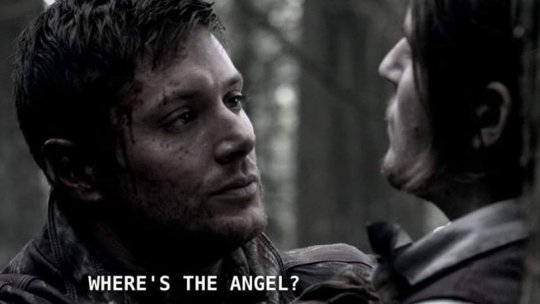
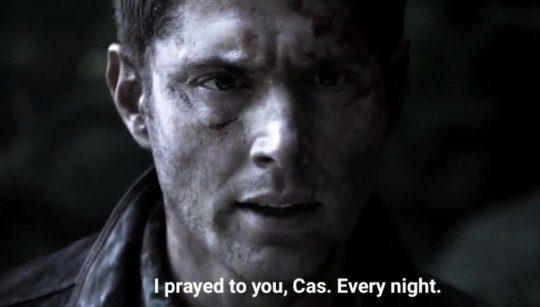
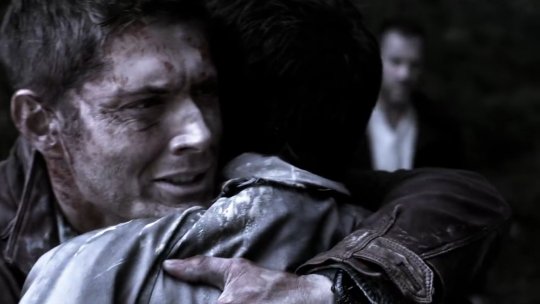
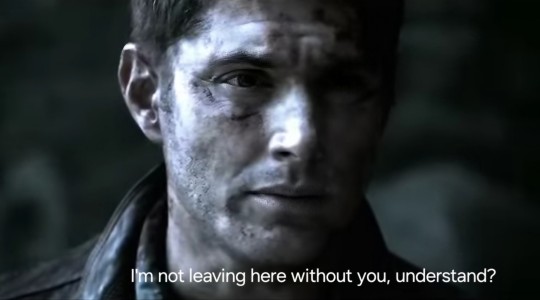
3K notes
·
View notes
Text
a primer course on T.MA for my mutuals who followed me from other blogs and would like to know what the fuck i’m talking about! (hi, guys. love you.) GONNA BE SPOILER-HEAVY IN HERE.
First off, big ups to the T.MA wiki, which you can consult on anything here, but this post is intended to serve as a very basic overview of the concepts relevant to this blog without forcing y'all to go into wiki levels of detail. The first part of this post is some general TMA terms and concepts, and the second part is some characters who have been relevant to Gerry's story specifically. If you're here for a better understanding of Gerry’s arc and don't care so much about the worldbuilding, scroll down to where I start talking about “who’s...?” and that should help you out.
what’s a “Leitner?” A Leitner is a book but spooky. They make bad things happen and, optionally, give you weird powers. They're usually tied to one of the fourteen(ish) Entities, which I will get into in a bit. Gerard hates these goddamn books, and has a knack for finding them and destroying them. His mother, Mary Keay, ran an antique bookstore that did serious business in them.
what’s an “avatar?” An avatar is a (former?) human working closely with one of the Entities. Over time, the influence of their Entity changes them, often granting them certain powers in exchange for a psychological and physiological need to serve their Entity.
what are these “Entities?” / what’s this “Hunt?” Put as simply as possible, the Entities are, like... fear elementals. There are roughly 14 different entities, though the boundaries between them aren’t clearly drawn in all circumstances. As follows, a quick overview:
The Eye. Fear of being surveiled. The need to know the answers to questions that may destroy you. The Eye is tied to the Magnus Institute. Its avatars can have the ability to magically Know things, understand all languages, and compel others to answer any questions they ask. Gerry was tied to the Eye and had some capacity for Knowing stuff, but wasn’t fully its avatar - or if he was, he refused to feed it, which must have hastened his death.
The Desolation. Fire, but without the warm fuzzy bits. Pure unhinged destruction. Desolation avatars can and will set you on fire with their minds. Gerry’s extensive burn scars are the result of fucking around with a Desolation cultist and finding out. (The cultist also fucked around with Gerry and found out. He’s not around anymore.)
The Hunt. Being tracked by something that won't stop until it kills you. The thrill of the chase. Hunt avatars are capable of killing other avatars, even those who would otherwise be unkillable. The possibility of Gerry being tied to the Hunt is never discussed in canon, but I’ve got my theories. (That last phrase is a link to a post discussing those theories, it just isn't showing up like a link on desktop for some reason.)
The End. Death and dying. Manifestations of the End often involve disruptions of the natural processes of life and death. For instance, the fucked-up necromancy book that Gerry got trapped in after dying was an outcropping of the End.
The Corruption. Bugs, disease, rot, etc. The Corruption's avatars may spread disease wherever they go, or they might just be chock full of worms. Potential of controlling a worm army.
The Flesh. The inherent weirdness of existing in a body. Cannibalism. Flesh avatars may be hulking, twisted parodies of the human form. They might steal your bones, turn you inside out, eat you, or all of the above.
The Distortion. The inherent weirdness of existing in a mind. Doors that shouldn't be there. Getting lost. Being unable to trust your own thoughts. Distortion avatars look, well, distorted when seen in reflections or through glass. Will probably try to get you to go through a door that wasn't there before. You won't like what's on the other side.
The Slaughter. War. Violence. Man's inhumanity to man. The Slaughter often manifests in groups as well as in individuals, so you could get an episode of mass hysteria where an entire small town turns to butchering one another, or you could get an office assistant who just aches to do murder.
The Web. Spiders. Being controlled by external forces. Can operate in extremely subtle ways. Can also just be an unkillable spider who wants you to have a bad time.
The Vast. Really big things. Heights. Your own terrifying insignificance on the cosmic scale.
The Buried. Claustrophobia. Being buried alive.
The Lonely. Being completely alone. Like, completely alone, and never coming back.
The Dark. What it says on the tin.
The Stranger. Something that's not quite right. A joke that you're not in on. Clowns and/or mannequins that might kill you and take your skin.
BONUS: The Extinction. While the other 14 fears have been established for a while (the most recent is the Flesh, which only really came into its own with the advent of mass meat farming), the Extinction is a nascent entity born of anxiety around the idea of the human race destroying itself, and/or being replaced by something else. The boundaries of what constitutes an Extinction manifestation, rather than just a warping of one of the other fears, are unclear.
what’s a “ritual?” Rituals are ways the Entities’ followers and avatars try to influence the world, usually with the end goal of making our world somewhere their Entity can live and feast full-time instead of just sporadically popping in.
what’s the “fearpocalypse?” The only successful ritual to date, as of the end of S4. Possibly the only successful ritual ever, given that it ended the world as we know it and let all 14 fears fully through the gate to fuck everything all the way up. The sky is full of eyeballs now and that's not even the biggest problem. This happened a while after Gerry’s death, but I have a verse where, due to his previous ties to the End and the general befuckening, Gerry is brought back to have a bad time with everyone else.
who’s Mary Keay? Gerard's mother, founder and proprietor of Pinhole Books. Had ambitions of starting a dynasty of supernatural power, starting with her only son Gerard, who ended up having other ideas. Flayed herself in a ritual to make herself “beyond death” via the fucked-up necromancy book mentioned earlier. Gerard was primed to take the fall for her seeming murder, but was let go after the book disappeared from evidence and several key witnesses retracted their testimony. Despite the ritual being incomplete, Mary remained tethered to the world of the living for five years before Gertrude Robinson finally wrapped that up.
who’s Gertrude Robinson? Head Archivist of the Magnus Institute, and a stone-cold BAMF with a habit of sacrificing those close to her for (her idea of) the greater good. The late Eric Delano asked her to look after his son Gerry, so naturally she let him live in torment with his abuser’s revenant for five fucking years, then swooped in when he was truly desperate. She got rid of Mary Keay for good, and got Gerard to travel the world with her attempting to prevent various apocalyptic rituals. The two would often pose as mother and son to strangers.
Being tied to the Eye, Gertrude seemed to be aware of Gerard’s impending death. After he passed away, she bound him into that fucked-up necromancy book and left him behind. (More on that here.) Gertrude was shot to death about a year later while trying to burn the Magnus Institute down and thereby prevent its head, Elias Bouchard, from doing anything apocalyptic. (Tragically, she did not succeed. SEE: “fearpocalypse.”)
who’s Eric Delano? Gerry’s father. Died too early to ever really get to know Gerry, despite the sacrifices he made to restructure his life for fatherhood. (We don’t need to go into the why of it here, but he did have to gouge his eyes out to try to be a stay-at-home dad. And he did it. We stan.) Unfortunately, he’d fallen in love with Mary Keay, who used him to produce an heir for her planned empire, then murdered him with a pair of garden shears and bound him into that fucked-up necromancy book. She later passed his page off to Gertrude Robinson, who spoke with him. In that conversation, he asked her to look after Gerry and begged her to burn his page, as being bound into the book was a world of suffering.
who’s Jurgen Leitner? A rich, reclusive Norwegian who thought it would be cool and smart to start a library explicitly for corralling forces beyond human comprehension. (He was wrong, and also stupid.) Collected spooky books and put his name in them, giving them their common name. Gerard hates this guy, associating him with the books that dominated his mother’s mind and indirectly ruined his life. He hunted Leitner down and nearly beat him to death for personal reasons. Upon meeting Leitner, he came away with the impression that this was just a scared old man, and couldn’t possibly be actually responsible for Jurgen Leitner’s library. Ultimately, he chose to spare Leitner's life. Unless we're talking about my canon-divergent Hunter!Gerry au, in which case he did not.
Anyways, hope this has been helpful. There's... a lot going on in TMA, but hopefully I've hit the parts that are most relevant to my writing here. If you have any questions about canon, please feel free to ask!
#and return from the ashes you call | RE: MARY ⚿#with all the lies in the books | RE: LEITNER ⚿#I'm writing this letter and wishing you well | RE: GERTRUDE ⚿#he said son when you grow up— | RE: ERIC ⚿
10 notes
·
View notes
Text
3 Tales of Disappointment
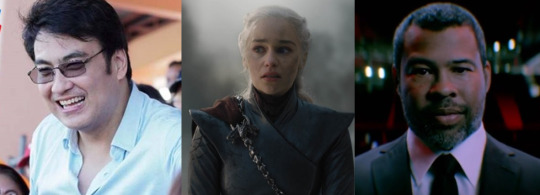
Disappointments. (Sigh)
The Twilight Zone
The promise of a contemporary revival of the sci-fi classic The Twilight Zone was met with open embrace especially when it was announced that Jordan Peele would helm the title. Peele’s foray into filmmaking with Get Out and Us, which all but cemented him as a maestro of social horrors, made him the perfect fit for the role of this generation’s Rod Serling. On paper, the project was a match made in heaven but only time could have known the output was far from the success everyone hoped it to be.
Issues at first were deemed minor with the bulk of criticism against the first two episodes directed at its overlong running time. The original series ran for only half an hour per episode with the exception of the fourth season which clocked at one hour every episode while the ongoing revival reaches up to an hour without commercial. It doesn’t even help that earlier episodes borrowed heavily from some of the original’s plotlines such as in the case of The Comedian and Nightmare at 30,000 Feet which added a level of predictability to the viewing experience. Although some bits were tweaked to frame the storylines in a more up-to-date context, the problem lies in the fact that in the original version of the episodes, everything was founded on novelty and to repeat such novelty robs the viewer of impact and meaningful experience.
Fortunately, the revival understands that relying on the past glory days of the original is a fruitless endeavor as the audience desire for stories culled from the current political climate and cultural patterns is one it needs to capitalize on. Unfortunately, as the show rolled from one episode to the next, the more it became obvious that the problem runs deeper than running time and bad adaptation; one that has to do with lack of subtlety. The writing on the show, especially on chapters which seek to leave grand social statements, has this tendency of spoon-feeding its narrative not before sidelining the sci-fi/supernatural element as an added measure to avoid the message getting lost in the gimmick. The recently aired episode titled “Not All Men” serves as a great example to how writers of the show love to oversimplify plotlines based on nuanced topics. As if the title isn’t already obvious enough, wait till you get to the part of the episode where a character repeatedly exclaims “It’s not all men” in attempt to highlight that toxic masculinity isn’t borne out of external forces, it’s borne from within. Subtle, indeed.
Game of Thrones
A disastrous case of plot over character. For a show that has amassed intense international following and morphed into a global cultural phenomenon, you’d hope writers of the show would owe it to its audience to deliver, if not satisfying, a logical ending to almost a decade of political machinations, medieval warfare and characters we’ve grown emotionally invested in. Instead, for its last season, Game of Thrones retcons most of established character developments and rushes the plot into one chaotic, unearned endgame.
Perhaps the biggest victim of character arc assassination is Cersei Lannister. Yes, Dany’s heel turn may seem sudden but throughout the run of the series, her madness and cruelty have been hinted ever since her ascent to power, it’s only in the handling of her story arc where she gets wronged. Writers allotted little development for a smiling Dany suddenly become an unhinged warlord in a span of only 2 episodes. For Cersei, not only is her writing poorly executed but also painfully out of character. At the end of season 6, she exercised her tactical prowess by blowing up the Sept along with most of House Tyrell and The High Sparrow thereby eradicating her immediate enemies all in one move. In the penultimate episode of the final season, she was reduced to a blubbering mess whose strategy of winning the war is basically watching everything unfold from her tower. Even her death lacks any payoff which is surprising given the track record of the show when it comes to delivering satisfying deaths of its villains.
I could have honestly forgone with the criticism of plot over character given the limited number of episodes and the fact that the season started off with two major plot arcs still yet to be resolved (Night King and Cersei) and yet even when the focus is on the plot, they still managed to fuck it up. The abrupt resolution to the Night King/White Walker arc is frustrating considering how since the very pilot episode, their threat has been emphasized and to eliminate such threat all in one battle, in one night is anti-climactic as hell. Even anywhere else you could see symptoms of bad writing from Brienne’s scorned lover b-plot to Euron’s fleet weaponry becoming a dragon killer, for the sake of advancing the plot, to utterly useless piles of wood during battle, for the sake of advancing the plot.
I could go on listing all my other grievances about the final season but something tells me with writers no longer give a fuck. Perhaps I should too.
Halalan 2019
I’d be lying if I said the current outcome of the senatorial election came as a shock to me. Although the votes are still at 96% completion as of writing, one could have seen the writing on the wall even before the start of the election if one were paying attention. It’s truly disappointing to see, if not most, all of the senatorial seats get filled with less-than-qualified administration lapdogs with zero opposition scoring a win but to say any of this is surprising is a stretch.
In the lead up to the midterm polls, collegiate mock up elections demonstrated that opposition candidates are greatly preferred by college students, mostly from prestigious universities which partly explains why liberal elites are quick to weaponized this against the working class and blame them for the outcome of the senatorial race when the ballots pointed to another reality. This line of thinking exposes a fault on the middle class specifically on how they’ve viewed the election through naïve lenses. No one could accuse candidates from opposition slate Otso Diretso of lacking noble principles but what they boasted in virtue they greatly lacked in strategy. While the opposition’s campaign did a great job of maintaining a solid core base of voters which comprised mostly of members of the middle class, they did nothing in winning over some swing voters which mainly came from the working class. Much of their campaign ads targeted the same audience and was made to arouse the same discussion on honor and values which at some point veered towards sounding holier-than-thou-ish.
From then on within the Otso Diretso supporters, it was all echo chambers; repeating the same old sentiments to the same group with the same political interest with little regards to anything else. Even when conversations were made about outside opinion, they were done to mock and in effect alienate what could have been more votes for the party. The total disconnect of the liberal elite from the realities of the majority of the people restricts them within the stubborn walls of the minority vote. The failure to recognize on the part of the opposition how extremely popular the administration is, with all its populist and strongman personality, shows how uninformed the candidates are to the desires of the public, which basically is the foundation of politics and governance. After all, before becoming a government of principle, you must first be a government of the people, no matter how dumb the people are.
0 notes